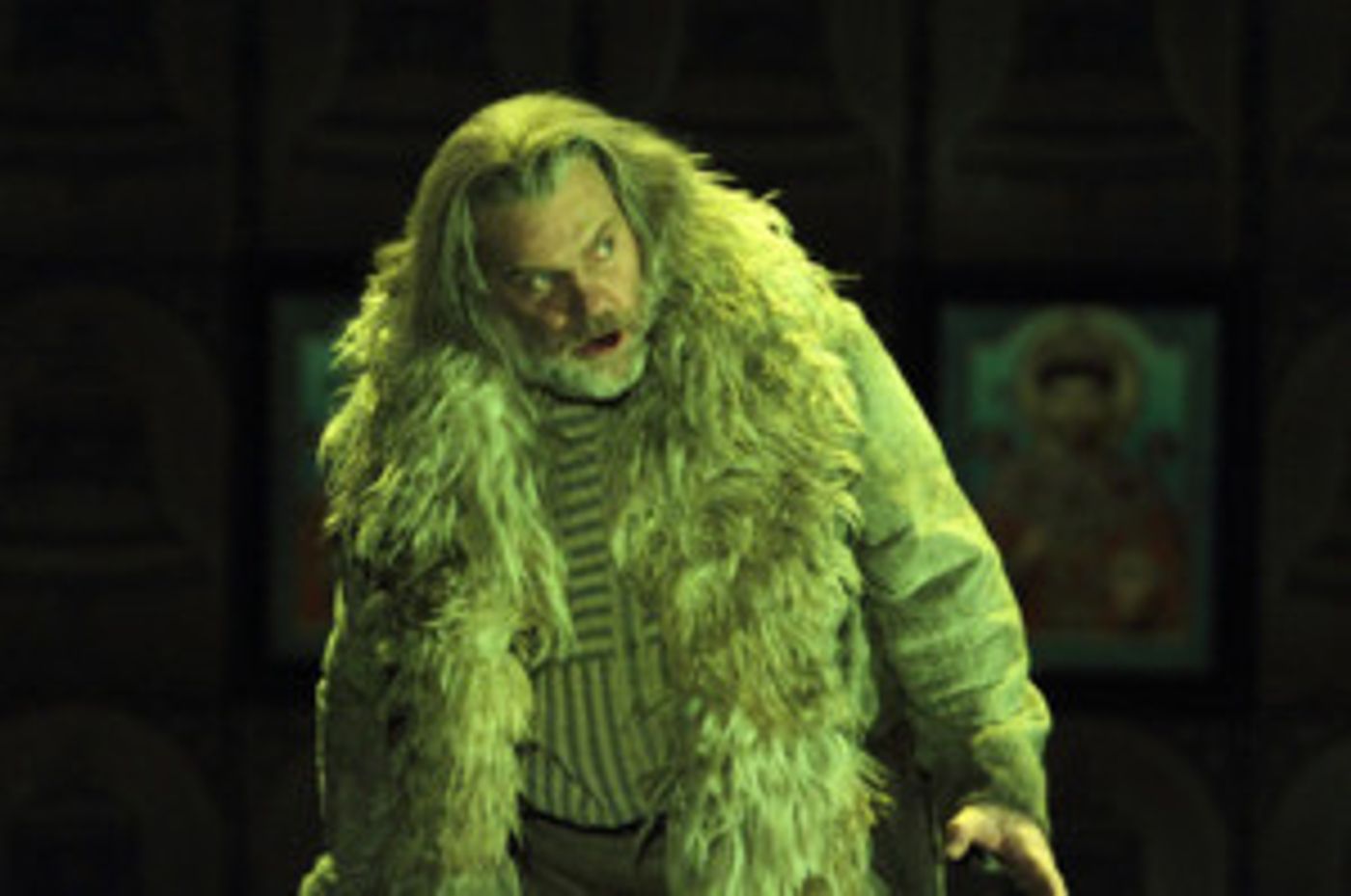Review: BORIS GODUNOV, Royal Opera House

![]() It is trite to say that Russia is vast, but it really hits you when you are there. And that vastness isn't just geographic - there's the vast suffering of the people, the vast history, the vast corruption. Somehow, such vastness demands that everything be transformed into an attempt to explain - or, at least, account for - this extraordinary country that seems at once European and Asian, fascinating and threatening, truthful and deceitful.
It is trite to say that Russia is vast, but it really hits you when you are there. And that vastness isn't just geographic - there's the vast suffering of the people, the vast history, the vast corruption. Somehow, such vastness demands that everything be transformed into an attempt to explain - or, at least, account for - this extraordinary country that seems at once European and Asian, fascinating and threatening, truthful and deceitful.
Set a century or so later than Andrei Tarkovsky's epic film, Andrei Rublev, Musorgsky's Boris Godunov focuses some of the same themes but instead of a sprawling cinematic masterpiece, we get an intense study of psychological torment. As ever, the eternal question, "What are we going to do about Russia?", slithers into every scene.
We see Boris brooding as his henchmen see off Tsarevich Dmitry, leaving the path clear for this great bear of a man to become Tsar. Like Julius Caesar, he hesitates when offered the crown - though Boris is not so much cynical and manipulative, as genuinely doubtful of poisoned chalice it represents. But the people plead for the leader who will be their father, and provide for them. Ambition does its job.
Years later, as they do, the people turn against their Tsar and, tormented by visions of the child Dmitry's murder, Boris begins to feel his sanity sliding away. News of a pretender to the throne rallying support in Lithuania makes things worse, the torment cranked up still further when rumours emerge that it is the real Dmitry, resurrected, to claim what is rightfully his. A suspicious and susceptible populace are seduced by the possibility.
Though the Moscow boyars identify the pretender as the opportunist, Grigory Otrepiev, and condemn him to death, it only takes a Holy Fool to speak truth to power for the visions to return still stronger and the guilt to bite deeper still into Boris's soul. When the monk, Pimen, tells of Dmitry appearing in dreams to perform miracles from beyond the grave, Boris is overwhelmed by the psychological trauma and summons his own son - the same age as Dmitry was - for a last conversation.
This revival of Richard Jones's production of the 1869 version is (almost) relentlessly grim, overflowing with machismo and, at 130 minutes without an interval, a physical and mental challenge. It's very much worth the effort.
Bryn Terfel is the troubled Tsar, taking us inside his head and singing powerfully, but with a fragility that informs every word. Terfel may have reached the age and status that stage actors need to deliver a rounded King Lear - Boris is a murderer, but we cannot help but sympathise with him, as his mind jumps between nightmares and reality. Terfel's marshalling of the music in that cause is masterful, the intensity of its melodies allowing the acting to be understated, and all the more chilling as a result.
Amongst the support, John Tomlinson and Harry Nicoll have a lot of fun as two drunk monks (the only light in an awful lot of shade) and, in a brief cameo, Haegee Lee impresses with the beauty of her soprano as Xenia, a daughter one feels unlikely to survive her father's demise for long.
Sam Furness dons a saucepan hat as the Fool who will say what others fear even to think. Roger Honeywell is excellent as the scheming apparatchik, Shuisky, the kind of courtier who is always in the shadows, assessing his next move as power shifts.
Matthew Rose piles on the gravitas as Pimen, the chronicler and conscience of the nation who inspires Grigory (a youthful, impetuous David Butt Philip) to his Lithuanian adventure and then returns to tip Boris over the edge with tales of miracles. Rose's bass, as befits the man to deal the fatal blow, is as impressive as Terfel's - one day, he will make a fine Boris.
The visuals are astonishing, set designer, Miriam Buether and costume designer, Nicky Gillibrand not holding back on the Russianness of it all, rank upon rank of priests in gilded robes, a hoard of peasants in rags, yawning spaces, darkened and full of incohate threat.
Musorgsky's music keeps coming too, portentous and foreboding, with more than a foreshadowing of West Side Story at times. Under Marc Albrecht, the orchestra never pauses and I've never heard them play with more clarity and pinpoint precision in this house.
With Russia as enigmatic and threatening as ever, Boris Godunov has as much to say about today as it does about the chaotic years after Ivan the Terrible's reign. See it - but get a good night's sleep before you strap in for the duration.
Boris Godunov continues at the Royal Opera House until 3 July.
Photo Catherine Ashmore
Reader Reviews
Videos

